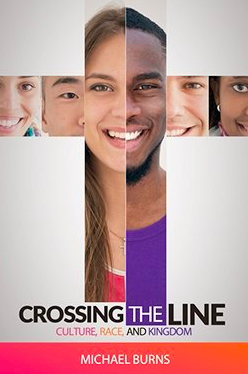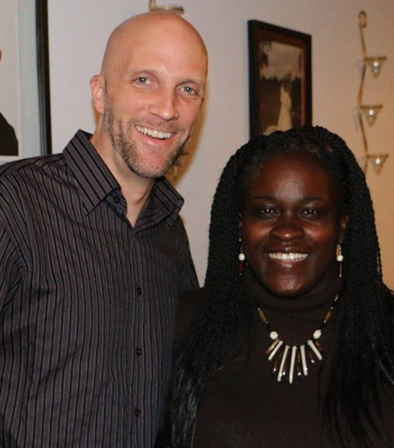An Introduction to Crossing the Line
01/01/2017 | By: Michael Burns
by Michael Burns -- Roseville, Minnesota, USA

In 2007, my wife and I moved to Appleton, Wisconsin, with our twelve- and four-year-old sons to lead the Fox Valley Church of Christ. Despite the idyllic scenery, small town charm, and loving church family, it was not all roses; especially not for our older son. I am what society has labelled “white” and my wife is what society calls “black.” One day our older son was confronted by another student who informed him, in “joke” form, that the difference between a bench and a black man is that a bench can support a family.
Not long after that, he went to sit by a friend at lunch in the cafeteria and was told by another boy that he had entered the “whites only” part of the lunchroom and needed to take his “nigger” self somewhere else. He was in a school of nearly 1,500 with fewer than ten black students and didn’t have many positive options available to him and talking to the school officials yielded little to nothing.
In the end, nothing much happened, and our older son struggled in that environment until 2012 when we finally moved to the Twin Cities and I began to serve as the Teacher in the Minneapolis-St. Paul Church of Christ.
What he, and to a lesser but still significant extent, my wife and younger son experienced in the community at large, was a sharp contrast to our experience in our family of churches, the International Churches of Christ. In fact, the racial, ethnic, and cultural diversity was the first thing that drew us into the Milwaukee Church of Christ where we were converted.
We have continued to love the ethnic and cultural diversity in our family of churches but along the way, we learned that this beautiful diversity has its challenges. The more varied and diverse a people are, the more difficult it will be to create and maintain unity. That’s a fact. And while we heard of and experienced little dustups or complaints over the years, for the most part what we saw and felt was this amazing and manifold kingdom of God that consisted of people of every tribe, language, and nation, so to speak.
But division is Satan’s specialty; and, like anything, cracks in our unity and diversity have started to appear over time. Not on the surface, of course. You can come any Sunday morning and see the same amazing mix of cultures. But in the day-to-day life of the community, tensions seemed to be rising.
As my wife and I have travelled across our fellowships we have learned that most disciples love their church and they love the kingdom of God. They love the ideal of being God’s one family of all nations, and they love their brothers and sisters.
But we also found that many of our brothers and sisters of color were grieved, and a part inside of them was in mourning; not all, but a definite majority. What I heard primarily was fear. Fear that the prejudices and inequities of the world had crept into our beloved church. They were bothered by the pattern of silence in the face of incidents of racial injustice that were playing out in the media. They were concerned at the perception of a mounting lack of representation of people of color in all levels of church leadership.
As I continued to listen, I heard a growing pattern of dissatisfaction in many churches about the cultural environment. People of color, particularly African American brothers and sisters, often felt that there was a dominant white culture in the church and that their voice and culture were either allowed only token input or not heard at all (although there are a few cases where the opposite is true). Many have expressed the feeling that they tend to feel welcome in the church as long as they “act white” and embraced expressions of white culture. And many have confirmed that even in our beloved fellowship they have experienced cases of prejudice or bigotry. Not to the level or degree of the world, but still, it is there.
I don’t think that we can ever end ethnic and cultural divisions, and institutions like racism in the world, nor is it prudent to even try. What we can do, however, is to address these issues openly and honestly in the family of God and to stand out like a bright light in a world of division and sectarianism.
Why talk about this? Imagine what would happen if my wife came to me today and requested that we have a heart-to-heart talk about some issues that she would like to address in our marriage. Rather than listening to her, though, I tell her, “No, we’re not going to talk about this.” She looks a bit taken aback, but before she can respond, I continue. “We have a great marriage; things are good. Why are you trying to mess that up?”
“Think of this biblically,” I go on. “The Bible makes it clear that we were once two separate people but when we came together in marriage, we became one flesh. That’s all there is to it,” I proudly state. “Why dredge up things from the past?”
She listens to me and then calmly says, “I want to talk about something from this morning.”
“Ahh,” I quickly blurt, “that’s the past!”
“Right now we are unified,” I continue, “because we are one. It’s great to be one. I love that we are one. That’s biblical truth. Nope, no argument there. No conversations needed. I think we’re good and we should just move along and enjoy our goodness.”
It probably will not take you a long time to figure out that if this was my actual response, the rest of the week is probably not going to be a pleasant one for me. You don’t get married, become one, and now the work is over and all that’s left is to preserve the perfect unity and oneness that you have achieved.
In the same way, imagine if a black brother or sister wanted to talk to me about what they have experienced in their multi-ethnic church, why they feel culturally marginalized at times, or the hurt they feel from what is happening in our country. What if I responded in that conversation the way I described speaking to my wife? What if I said, “Brother, why are you trying to cause division? There is just one race, the human race. The Bible is very clear on that. The only answer to racism is not to complain or see it as a boogey- man behind every bush. We are all one in Christ, so you need to repent of this divisiveness. God has already joined us together and there is no black or white.”
And imagine that, when my friend asks if it’s a conversation that we could have as a church and maybe even do some teaching on it, I respond by telling him that such conversations are pointless because they’re just going to dig up conflicting feelings and perspectives and divide our fellowship.
Yes, we are one in Christ. There is no question that there is great truth behind this and similar ideas, but if we leave it there, such beloved truths of God’s kingdom can quickly become empty platitudes.
The truth contained in those statements is that we are all one in Christ. That’s an undeniable biblical reality for those that have been immersed into his life. There is only the one, human race, say the Scriptures. But as in a marriage, this is the starting point. When God’s people seek to obey the Scriptures by being comprised of all nations and people groups, a difficult process has begun. What comes next is a lot of hard work. These little slogans that we toss out, like “There is just one race, the human race,” and “We should all be colorblind” often serve as conversation enders, not starters. If I responded to my wife with the idea that she shouldn’t bring up issues or try to work on our marriage because we are one, that would be flippant. It would twist a truth into an agent of stagnation. The same is true if we toss out platitudes when it comes to the topics of racism, race, and culture.
Here’s the rub: statements like “We are one” are true, but they only remain true if a lot of effort, honest conversation, and difficult changes are constant. The minute that that environment fades away is the moment that those statements cease to be true. Bringing up concerns and wanting to talk about them in an open and real way is not disruptive; it is the foundation for true unity and continued growth.
The fact is that being a family of all nations is central to the Gospel (Matthew 28:28-20; Galatians 3:7-9), so the idea that we won’t constantly need to address issues of racial unity and cultural inclusion is naïve at best and dangerous at worst.
There is no question that issues of racism, race, and culture have once again taken center stage in our society. These are issues that bring out deep passion and potential conflict in the world; and because disciples live in this world, they affect us, our mission, and our unity.
If we’re not careful and don’t address these topics biblically and with great love, patience, and grace, they could wind up ripping Christians apart. Every potential problem like this, though, can be a pitfall or a platform. It can be our undoing or an amazing opportunity to put the power and wisdom of the true gospel on display. It is encouraging that these conversations are now taking place in some locations. I am under no illusion that this book is the beginning of something. It is a continuation and it is a call for learning, understanding, and, most of all, open and honest discussion.
Michael Burns is a Teacher in the Minneapolis-St. Paul church of Christ. He is a graduate of Wesley Seminary of Indiana Wesleyan University (MA). He taught high school history in the central city of Milwaukee for nearly ten years. He is a national and international biblical teacher at churches and workshops. He is the founder and director of the Ministry Development and Training Academies centered in Minneapolis, Minnesota, and serves as an instructor in Ministry Training Academies in Africa. He is the author of the twelve-volume C.O.R.E. Curriculum books. He married his wife, MyCresha, in 1997. They have two sons and reside in Roseville, Minnesota.


